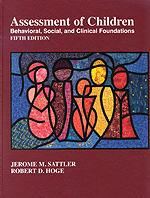|
JEROME M. SATTLER, PUBLISHER, INC. |
|||
|
PREFACE
A person who is
severely impaired never knows his hidden sources of strength until he is
treated like a normal human being and encouraged to shape his own life. The fifth edition of Assessment of Children: Behavioral, Social, and Clinical Foundations is designed to be used as an independent text in such courses as personality assessment, behavioral assessment, and child clinical assessment. It can also be used together with Assessment of Children: Cognitive Applications, Fourth Edition and Assessment of Children: WISC–IV and WPPSI–III Supplement to provide in-depth coverage of assessment of children. Like former editions, the fifth edition of Assessment of Children: Behavioral, Social, and Clinical Foundations is designed not only as a teaching text but also as a reference book for students and professionals. This is a major revision. Every chapter has been rewritten to make the text more comprehensive, relevant, readable, up to date, and informative. The book contains new chapters on assessment theory, psychometrics, culturally and linguistically different children, and report writing. We have given expanded coverage to broad measures of behavioral, social, and emotional functioning and to parenting and family variables. In addition, we have included reviews of specific measures for assessing antisocial behavior disorders, anxiety disorders, depressive disorders, risk of suicide, and substance abuse disorders. Assessment of Children: Behavioral, Social, and Clinical Foundations, Fifth Edition also contains several useful assessment aids and intervention guidelines:
Assessment of Children: Behavioral, Social, and Clinical Foundations, Fifth Edition contains several useful learning aids:
The text also includes cartoons touching on assessment, psychology, and education. The cartoons provide comic relief and serve as teaching and learning tools. This book is based on the philosophy that a psychologist cannot be a competent clinical assessor unless he or she has the relevant information about the child’s presenting problem, assets and limitations, family, classroom, and environment, as well as knowledge of the techniques needed to perform the assessments and interventions that might help the child and family. In this text, you will find information to help you become a competent clinical assessor. Clinical assessors must be mindful of the prominent place that litigation occupies in American society. Those who seek legal recourse to change a diagnosis or recommendation may question assessment results and the decisions reached on the basis of assessment results. Therefore, we strongly urge you to assume that everything you do has potential legal consequences. The best strategy is to be prepared. You can do this by (a) using the most appropriate assessment techniques and instruments, (b) maintaining accurate and complete records, and (c) keeping up with the research and clinical literature in your field. Underlying any assessment should be respect for children and their families and a desire to help children. A thorough assessment should allow assessors to learn something about the child that they could not learn from simply talking to others about the child, observing the child, or reviewing the child’s records. Assessment makes a difference in the lives of children and their families, as well as in the actions of the professionals, including educators, who work with children and their families. Note to instructors: An Instructor’s Manual accompanies Assessment of Children: Behavioral, Social, and Clinical Foundations, Fifth Edition. The manual contains multiple-choice questions useful for objective examinations.
|

